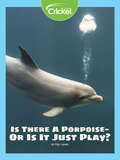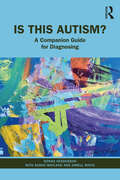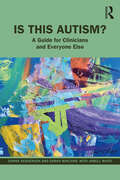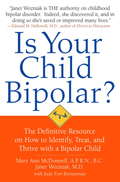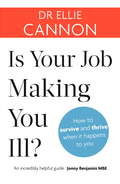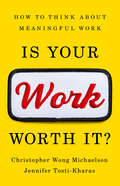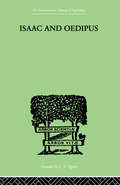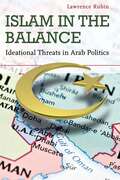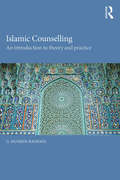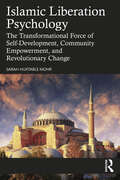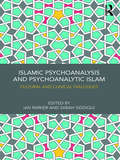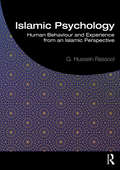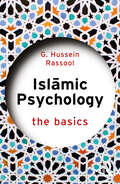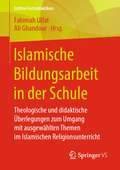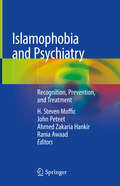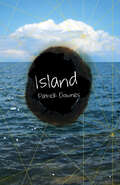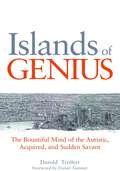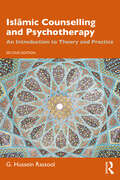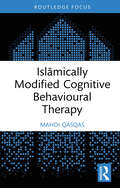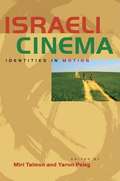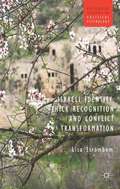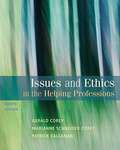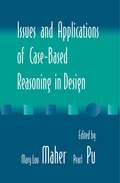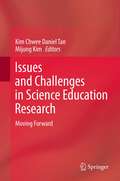- Table View
- List View
Is There a "Porpoise"—Or Is It Just Play?
by Peg LopataAs dolphins flip, whirling through blue waters and creating bubbles with their dorsal fins, scientists study if this playful act is fun and not just instinctual behavior, or as some marine psychologists believe, that porpoises practice hunting skills. Enjoy discovering what dolphins learn through playing games like “keep away” in our oceans and freshwater rivers!
Is This Autism?: A Companion Guide for Diagnosing
by Donna Henderson Sarah Wayland Jamell WhiteThis companion guide to Is This Autism? A Guide for Clinicians and Everyone Else shows clinicians how to assess for the possibility of autism in clients of all ages. Understanding of autism has greatly expanded in recent years, and many clinicians feel ill-equipped or confused about how to incorporate this knowledge into their diagnostic process. As a result, countless unidentified autistic people do not have reasonable access to proper identification or support. This book describes current assessment methods, including interviewing, rating scales, self-report measures, social cognition tests, and behavioral observations. It also provides guidance regarding cultural considerations, common mistakes, and how to communicate with and support clients through the diagnostic process. This very practical clinical guide provides a clear and neurodiversity-affirmative approach to autism assessment, particularly for autistic individuals who have previously been missed. It is relevant to all healthcare professionals who want to learn how to identify autism in their clients.
Is This Autism?: A Guide for Clinicians and Everyone Else
by Donna Henderson Sarah Wayland Jamell WhiteThough our understanding of autism has greatly expanded, many autistic individuals are still missed or misdiagnosed. This highly accessible book clarifies many ways that autism can present, particularly in people who camouflage to hide their autistic traits. The authors take the reader step by step through the diagnostic criteria, incorporating the latest research as well as quotes from over 100 autistic contributors that bring that research to life. They also describe many aspects of autism that are not included in the current diagnostic criteria, such as autistic strengths and co-occurring disorders. Readers will learn about highly relevant topics, such as different types of empathy, sensory systems that are not well known, neuro-crash and burn out, and relative versus absolute thinking. This book provides a deep, current, and neurodiversity-affirmative understanding of the less obvious presentations of autism. It is relevant to all healthcare professionals, educators, family members, autistic individuals, and anyone who is curious about autism. A clinical companion guide, Is This Autism? A Companion Guide for Diagnosing, is available for clinicians who make mental health diagnoses.
Is Your Child Bipolar? The Definitive Resource on How to Identify, Treat, and Thrive with a Bipolar Child
by Mary Ann Mcdonnell Janet Wozniak Judy Fort BrennemanDesigned as a definitive resource on how to identify bipolar disorders in children, this book also focuses of effective treatments and resources available to parents today. McDonnell, who head her own non-profit organization supporting bipolar children, and Wozniak (Harvard Medical School) offer practical information on how to cope with bipolar children and teens and communicate concerns effectively to doctors, teachers and counselors. A section is included on how to properly diagnose a bipolar disorder, and how not to confuse this condition with other types of personality disorders. Annotation ©2008 Book News, Inc. , Portland, OR (booknews. com)
Is Your Job Making You Ill?: How to survive and thrive when it happens to you
by Dr Ellie Cannon'An incredibly helpful guide' Jonny Benjamin MBE'Groundbreaking . . . so relatable given the current way we approach our work' Amy Wall, Woman's WayWhat happens when the effects of work are far more detrimental to your wellbeing than a simple case of Sunday-night blues?Whether you're suffering from work-induced high blood pressure, depression, migraines, or panic attacks, Dr Ellie Cannon has the answer - and it's not quitting your job.We all have a moan about going to work: groaning about getting on the bus in the rush hour, counting down to the weekend. A gripe here and there is understandable and expected, but what happens when your job is making you mentally or physically unwell?When you are in this situation, it can be very difficult to know where to turn, who to speak to or where to find good quality help and advice. In Is Your Job Making You Ill?, Dr Ellie Cannon uses her decade of experience treating patients to create an essential resource for anybody suffering from job-related ill-health.Part one of the book lays out the key causes of job-related illness - from the pressure of an unmanageable workload to the challenges of an emotionally-draining job - and identifies the most common illnesses and symptoms which can occur as a result, including stress, anxiety, insomnia, high blood pressure and IBS.Part two will help you to find a way out. It includes a practical, self-directed programme that can be tailored to your individual circumstances, covering everything from where to find help, when (and if) to seek professional advice or take time off work, to micro-actions like improving your commute and adjusting your diet to support a healthy lifestyle.Work-related ill health can happen to anyone. This book is all about how to survive and thrive when it happens to you. Don't let your job rule your life anymore.
Is Your Job Making You Ill?: How to survive and thrive when it happens to you
by Ellie Cannon'An incredibly helpful guide' Jonny Benjamin MBE'Groundbreaking . . . so relatable given the current way we approach our work' Amy Wall, Woman's WayWhat happens when the effects of work are far more detrimental to your wellbeing than a simple case of Sunday-night blues?Whether you're suffering from work-induced high blood pressure, depression, migraines, or panic attacks, Dr Ellie Cannon has the answer - and it's not quitting your job.We all have a moan about going to work: groaning about getting on the bus in the rush hour, counting down to the weekend. A gripe here and there is understandable and expected, but what happens when your job is making you mentally or physically unwell?When you are in this situation, it can be very difficult to know where to turn, who to speak to or where to find good quality help and advice. In Is Your Job Making You Ill?, Dr Ellie Cannon uses her decade of experience treating patients to create an essential resource for anybody suffering from job-related ill-health.Part one of the book lays out the key causes of job-related illness - from the pressure of an unmanageable workload to the challenges of an emotionally-draining job - and identifies the most common illnesses and symptoms which can occur as a result, including stress, anxiety, insomnia, high blood pressure and IBS.Part two will help you to find a way out. It includes a practical, self-directed programme that can be tailored to your individual circumstances, covering everything from where to find help, when (and if) to seek professional advice or take time off work, to micro-actions like improving your commute and adjusting your diet to support a healthy lifestyle.Work-related ill health can happen to anyone. This book is all about how to survive and thrive when it happens to you. Don't let your job rule your life anymore.
Is Your Work Worth It?: How to Think About Meaningful Work
by Jennifer Tosti-Kharas Christopher Wong MichaelsonWhat is work that&’s worth doing in a life worth living? A revealing exploration of the questions we ask and the stories we tell about our work. According to recent studies, barely a third of American workers feel &“engaged&” at work, and for many people around the world, happiness is lowest when earning power is highest. After a global pandemic that changed why, how, and what people do for a living, many workers find themselves wondering what makes their daily routine worthwhile. In Is Your Work Worth It?, two professors – a philosopher and organizational psychologist – investigate the purpose of work and its value in our lives. The book explores vital questions, such as: Should you work for love or money? When and how much should you work? What would make life worth living in a world without work? What kind of mark will your work leave on the world? This essential book combines inspiring and harrowing stories of real people with recent scholarship, ancient wisdom, arts, and literature to help us clarify what worthy work looks like, what tradeoffs are acceptable to pursue it, and what our work can contribute to society.
Isaac And Oedipus: A STUDY IN BIBLICAL PSYCHOLOGY OF THE SACRIFICE OF ISAAC (International Library Of Psychology Ser.)
by Wellisch, EFirst Published in 1999. Routledge is an imprint of Taylor & Francis, an informa company.
Islam in the Balance: Ideational Threats in Arab Politics
by Lawrence RubinIslam in the Balance: Ideational Threats in Arab Politics is an analysis of how ideas, or political ideology, can threaten states and how states react to ideational threats. It examines the threat perception and policies of two Arab, Muslim majority states, Egypt and Saudi Arabia, in response to the rise and activities of two revolutionary "Islamic states," established in Iran (1979) and Sudan (1989). Using these comparative case studies the book provides important insight about the role of religious ideology for the international and domestic politics of the Middle East and, in doing so, advances our understanding of how, why, and when ideology affects threat perception and state policy. Rubin makes clear that transnational ideologies may present a greater and more immediate national security threat than shifts in the military balance of power: first because ideology, or ideational power, triggers threat perception and affects state policy; second because states engage in ideational balancing in response to an ideological threat. The book has significant implications for international relations theory and engages important debates in comparative politics about authoritarianism and Islamic activism. Its findings about how an Islamist regime or state behaves will provide vital insight for policy creation by the US and its Middle East allies should another such regime or state emerge.
Islamic Counselling: An Introduction to theory and practice
by G. Hussein RassoolIslamic counselling is a form of counselling which incorporates spirituality into the therapeutic process. Until now there has been little material available on the subject with no one agreed definition of Islamic counselling and what it involves. There has also been a rapidly growing population of Muslims in Western societies with a corresponding rise in need of psychological and counselling services. Islamic Counselling: An Introduction to theory and practice presents a basic understanding of Islamic counselling for counsellors and Islamic counsellors, and provides an understanding of counselling approaches congruent with Islamic beliefs and practices from a faith-based perspective. The book is designed as an introduction for counsellors, its goal is to inform the reader about how the diverse roles of the Islamic counsellor fit together in a comprehensive way and to provide the guidelines that can be potentially integrated into a theoretical framework for use. The book is divided into two parts. Section one: Context and Background, and Section two: Assessment, Models and Intervention Strategies. Islamic Counselling encompasses both current theory, research and an awareness of the practice implications in delivering appropriate and effective counselling interventions with Muslim clients. It will be essential reading for both professionals and students alike.
Islamic Liberation Psychology: The Transformational Force of Self-Development, Community Empowerment, and Revolutionary Change
by Sarah Huxtable MohrIslamic Liberation Psychology is a thoughtful and groundbreaking guide to liberatory and decolonial thought. The book has a wide range of uses, from individuals seeking self-development, to community organizers, to change makers generally. Chapters explore liberation psychology from an Islamic perspective and use autoethnography to frame the theory and make it more relevant and applicable.This book makes a substantial contribution to a greater understanding of a variety of topics including anti-racism, feminism, utopianism, community development, arts and creativity, and other topics central to Islamic liberation psychology.
Islamic Psychoanalysis and Psychoanalytic Islam: Cultural and Clinical Dialogues
by Ian Parker Sabah SiddiquiThis pioneering volume brings together scholars and clinicians working at the intersection of Islam and psychoanalysis to explore both the connections that link these two traditions, as well as the tensions that exist between them. Uniting authors from a diverse range of traditions and perspectives, including Freudian, Jungian, Lacanian, Object-Relations, and Group-Analytic, the book creates a dialogue through which several key questions can be addressed. How can Islam be rendered amenable to psychoanalytic interpretation? What might an ‘Islamic psychoanalysis’ look like that accompanies and questions the forms of psychoanalysis that developed in the West? And what might a ‘psychoanalytic Islam’ look like that speaks for, and perhaps even transforms, the forms of truth that Islam produces? In an era of increasing Islamophobia in the West, this important book identifies areas where clinical practice can be informed by a deeper understanding of contemporary Islam, as well as what it means to be a Muslim today. It will appeal to trainees and practitioners of psychoanalysis and psychotherapy, as well as scholars interested in religion and Islamic studies.
Islamic Psychology: Human Behaviour and Experience from an Islamic Perspective
by G. Hussein RassoolIslamic Psychology or ilm an-nafs (science of the soul) is an important introductory textbook drawing on the latest evidence in the sub-disciplines of psychology to provide a balanced and comprehensive view of human nature, behaviour and experience. Its foundation to develop theories about human nature is based upon the writings of the Qur'an, Sunna, Muslim scholars and contemporary research findings. Synthesising contemporary empirical psychology and Islamic psychology, this book is holistic in both nature and process and includes the physical, psychological, social and spiritual dimensions of human behaviour and experience. Through a broad and comprehensive scope, the book addresses three main areas: Context, perspectives and the clinical applications of applied psychology from an Islamic approach. This book is a core text on Islamic psychology for undergraduate and postgraduate students and those undertaking continuing professional development in Islamic psychology, psychotherapy and counselling. Beyond this, it is also a good supporting resource for teachers and lecturers in this field.
Islamic Psychology: The Basics (The Basics)
by G. Hussein RassoolIslamic Psychology: The Basics is a jargon-free and accessible introduction that explores psychology from an Islāmic perspective, and provides a foundation level overview of the fundamental principles and practices of Islāmic psychology. The book introduces concepts, models, approaches, themes, and theories you need to know to study the mind, soul, and behaviour based on Islāmic scripture. Offering an overview of Islāmic psychology and what Islāmic psychologists do, chapters address key topics including the history of the evolution of the science of the soul, and the psychology of human behaviour and experiences. Rassool examines the concepts of the Fitrah, the Nafs (Self), the Aql (Intellect), the Rūḥ (Soul) the Qalb (Heart), and the concept of Islāmic healing and spiritual interventions. Other themes include the Qur’an and psychology, models and approaches in Islāmic psychology, interpreting Islāmic psychology for modern times, and the contemporary scope of the practice of Islāmic psychology. Outlining the challenges and solutions of the development of Islāmic psychology and potential future trends, and including features to aid learning, this is the ideal introductory book for students in Psychology, Islāmic Psychology, and Islāmic Studies, as well as professionals including counsellors and therapists, and anyone interested in psychology from an Islāmic perspective.
Islamische Bildungsarbeit in der Schule: Theologische und didaktische Überlegungen zum Umgang mit ausgewählten Themen im Islamischen Religionsunterricht (Edition Fachdidaktiken)
by Fahimah Ulfat Ali GhandourDer Band ermöglicht unterschiedliche Zugänge und Denkkulturen zu verschiedenen theologischen Thematiken, die vordergründig aus einer Bildungsperspektive gedacht werden. Dabei wird die Breite der muslimischen Konzepte in ihrer Pluralität abgedeckt, mit je nach Autorin oder Autor systematischen, philologischen, philosophischen oder historischen Schwerpunktsetzungen, sowie einer pädagogischen Schwerpunktsetzung.
Islamophobia and Psychiatry: Recognition, Prevention, And Treatment
by H. Steven Moffic John Peteet Ahmed Zakaria Hankir Rania AwaadThe book begins by covering the general and clinical challenges that are unique to Muslims, drawing from an internationally, ethnically, and intergenerationally diverse pool of experts. The text covers not only how psychiatrists and other clinicians can intervene successfully with patients, but how we as clinicians can have a role in addressing other societally connected mental health challenges arising from Islamophobia. The text addresses three related but distinct areas of interest: Islamophobia as a destructive force, Islam as a religion that is threatened by stigma and misinformation, and the novel intersection of these forces with the field of psychiatry. Islamophobia and Psychiatry is a vital resource for all clinicians and clinicians in training who may encounter patients struggling with these issues, including adult and child psychiatrists, psychologists, primary care physicians, counselors, social workers, and others.
Island
by Patrick DownesA teenaged boy struggles as he watches his family and relationships fracture after the death of his mother, and is now faced with the terrible possibility that his twin brother may have just killed their father.Seventeen-year-old Rad comes home to find his father lying broken and dead at the bottom of the ravine behind their house. Rad’s twin brother, shaken but very much alive, had watched their father fall.Desperate to understand what has happened before calling the police, Rad confronts his brother and the complicated landscape of their past. He reconstructs not just the circumstances leading to his father’s death, but the history of his family.How can a family simply disintegrate? Were they ever happy, or were the roots of unhappiness always there? What plagued his father? What plagues Rad?As the time comes to do the right thing, the question remains. Did his brother kill their father? And what will happen to the boys now?
Islands of Genius
by Darold A. Treffert* Gold Medal Winner in the Psychology / Mental Health Category of the 2011 IPPY Awards ** Silver Medal Winner in the 2010 BOTYA Awards Psychology Category *Savant syndrome is a rare condition in which individuals with developmental disorders, including autism spectrum disorders, have one or more areas of expertise, ability, or brilliance - "islands of genius" - that exist in contrast with their overall limitations. In this fascinating book, Dr. Darold Treffert looks at what we know about this remarkable condition, and at new discoveries that raise interesting questions about the hidden brain potential within us all. Dr. Treffert explores the phenomena of genetic memory - instances in which individuals somehow "know" things they never learned - and sudden genius or "acquired savantism" - where a neuro-typical person unexpectedly and spectacularly develops savant-like abilities following a head injury or stroke. Showing that these phenomena point convincingly towards a reservoir of untapped potential - an inner savant capacity - within us all, he looks both at how savant skills can be nurtured, and how they can help the person who has them, particularly if that person is on the autism spectrum. A central colour section contains the extraordinary artwork of some of the savants who are mentioned in the book. Islands of Genius will intrigue anyone who has ever wondered what makes the mind of a savant tick, as well as clinicians, parents, teachers, therapists, and others who care for, and about, individuals with savant syndrome.
Islāmic Counselling and Psychotherapy: An Introduction to Theory and Practice
by G. Hussein RassoolIslāmic Counselling and Psychotherapy: An Introduction to Theory and Practice provides foundation-level knowledge of and perspective on the fundamental principles and practices of counselling and psychotherapy from an Islāmic perspective.This groundbreaking practical framework incorporates Islāmic spirituality, religion, and cultural contexts into the therapeutic process. It makes the case that authentic Islāmic spirituality, based on submission to God, forms the cornerstone of good mental health. The book’s foundation focuses on the therapist’s role and ethical considerations specific to Islāmic psychotherapy. It explores the integration of Qur’ânic teachings and hādīths and delves into dream interpretation and the clinical applications of the Siraat Al-Islāmic psychotherapy practice model. This thoroughly revised new edition also highlights advances and developments in scholarship and evidence-based practices and introduces postmodern psychotherapy approaches like narrative and hope therapy. This text provides a clear understanding of the nature, scope, and process of Islāmic psychotherapy for Islāmic practitioners or clinicians working with Muslim clients.
Islāmically Modified Cognitive Behavioural Therapy (Islamic Psychology and Psychotherapy)
by Mahdi QasqasThis book outlines the methods and practice of Islāmically Modified Cognitive Behavioural Therapy (IMCBT), a modified version of CBT adapted to the Muslim client’s preferences, culture, and religion.The book begins by establishing IMCBT’s fidelity to the core competencies and evidence-based practices of CBT while also introducing new unique features and interventions related to Muslim clients. It uses real-life cases to off er practical strategies for overcoming stigma, forming the therapeutic alliance, structuring the session, and utilising the client’s faith for coping and problem-solving. Chapters comprehensively provide CBT skills competencies with Islāmic modifications for a range of topics including case conceptualisation, reframing, cognitive restructuring, and advanced coping strategies for addressing interpersonal conflicts and enhancing therapeutic outcomes. The book also offers both proscriptive and prescriptive ethical guidance by showcasing instances where clients experienced negative outcomes with other practitioners to emphasise the dangers of not properly preparing for and understanding how to work with Muslims who prioritise their faith.This book will appeal to practitioners, educators, and students who are seeking deeper ways of adapting their practice, teaching, or learning to the Muslim client’s needs while also maintaining fidelity to the core features of CBT.
Israeli Cinema
by Miri Talmon Yaron PelegWith top billing at many film forums around the world, as well as a string of prestigious prizes, including consecutive nominations for the Best Foreign Film Oscar, Israeli films have become one of the most visible and promising cinemas in the first decade of the twenty-first century, an intriguing and vibrant site for the representation of Israeli realities. Yet two decades have passed since the last wide-ranging scholarly overview of Israeli cinema, creating a need for a new, state-of-the-art analysis of this exciting cinematic oeuvre. The first anthology of its kind in English, Israeli Cinema: Identities in Motion presents a collection of specially commissioned articles in which leading Israeli film scholars examine Israeli cinema as a prism that refracts collective Israeli identities through the medium and art of motion pictures. The contributors address several broad themes: the nation imagined on film; war, conflict, and trauma; gender, sexuality, and ethnicity; religion and Judaism; discourses of place in the age of globalism; filming the Palestinian Other; and new cinematic discourses. The authors’ illuminating readings of Israeli films reveal that Israeli cinema offers rare visual and narrative insights into the complex national, social, and multicultural Israeli universe, transcending the partial and superficial images of this culture in world media.
Israeli Identity, Thick Recognition and Conflict Transformation (Palgrave Studies in Political Psychology)
by Lisa StrömbomThe divisive and malleable nature of history is at its most palpable in situations of intractable conflict between nations or peoples. This book explores the significance of history in informing the relationship between warring parties through the concept of thick recognition and by exploring its relevance specifically in relation to Israel.
Issues And Ethics In The Helping Professions
by Gerald Corey Patrick Callanan Marianne CoreyAimed at both undergraduate and graduate students in the helping professions, this textbook addresses various ethical, legal, and professional issues they will encounter in their future careers. Each chapter begins with a self-inventory, and open-ended cases and situations are presented throughout to stimulate thought and discussion. Topics include (for example) the management of boundaries; the incorporation of spiritual and religious values; and the fulfillment of record keeping responsibilities.
Issues and Applications of Case-Based Reasoning to Design
by Mary Lou Maher Pearl PuDesign is believed to be one of the most interesting and challenging problem-solving activities ever facing artificial intelligence (AI) researchers. Knowledge-based systems using rule-based and model-based reasoning techniques have been applied to build design automation and/or design decision support systems. Although such systems have met with some success, difficulties have been encountered in terms of formalizing such generalized design experiences as rules, logic, and domain models. Recently, researchers have been exploring the idea of using case-based reasoning (CBR) techniques to complement or replace other approaches to design support. CBR can be considered as an alternative to paradigms such as rule-based and model-based reasoning. Rule-based expert systems capture knowledge in the form of if-then rules which are usually identified by a domain expert. Model-based reasoning aims at formulating knowledge in the form of principles to cover the various aspects of a problem domain. These principles, which are more general than if-then rules, comprise a model which an expert system may use to solve problems. Model-based reasoning (MBR) is sometimes called reasoning from first principles. Instead of generalizing knowledge into rules or models, CBR is an experience-based method. Thus, specific cases, corresponding to prior problem-solving experiences, comprise the main knowledge sources in a CBR system. This volume includes a collection of chapters that describe specific projects in which case-based reasoning is the focus for the representation and reasoning in a particular design domain. The chapters provide a broad spectrum of applications and issues in applying and extending the concept of CBR to design. Each chapter provides its own introduction to CBR concepts and principles.
Issues and Challenges in Science Education Research
by Mijung Kim Kim Chwee TanIn contemporary society, science constitutes a significant part of human life in that it impacts on how people experience and understand the world and themselves. The rapid advances in science and technology, newly established societal and cultural norms and values, and changes in the climate and environment, as well as, the depletion of natural resources all greatly impact the lives of children and youths, and hence their ways of learning, viewing the world, experiencing phenomena around them and interacting with others. These changes challenge science educators to rethink the epistemology and pedagogy in science classrooms today as the practice of science education needs to be proactive and relevant to students and prepare them for life in the present and in the future. Featuring contributions from highly experienced and celebrated science educators, as well as research perspectives from Europe, the USA, Asia and Australia, this book addresses theoretical and practical examples in science education that, on the one hand, plays a key role in our understanding of the world, and yet, paradoxically, now acknowledges a growing number of uncertainties of knowledge about the world. The material is in four sections that cover the learning and teaching of science from science literacy to multiple representations; science teacher education; the use of innovations and new technologies in science teaching and learning; and science learning in informal settings including outdoor environmental learning activities. Acknowledging the issues and challenges in science education, this book hopes to generate collaborative discussions among scholars, researchers, and educators to develop critical and creative ways of science teaching to improve and enrich the lives of our children and youths.
